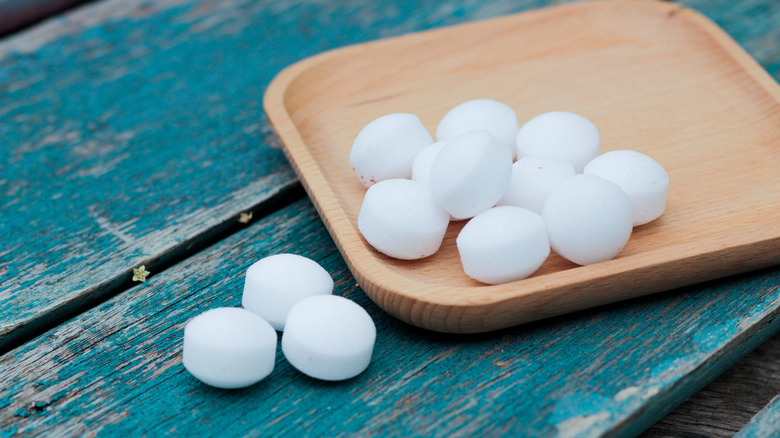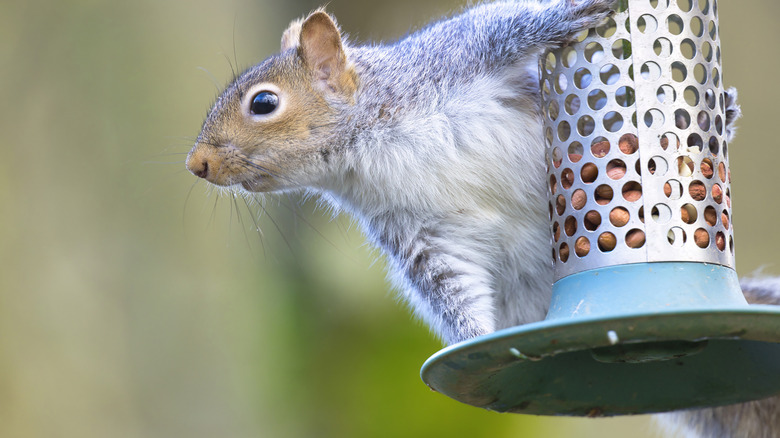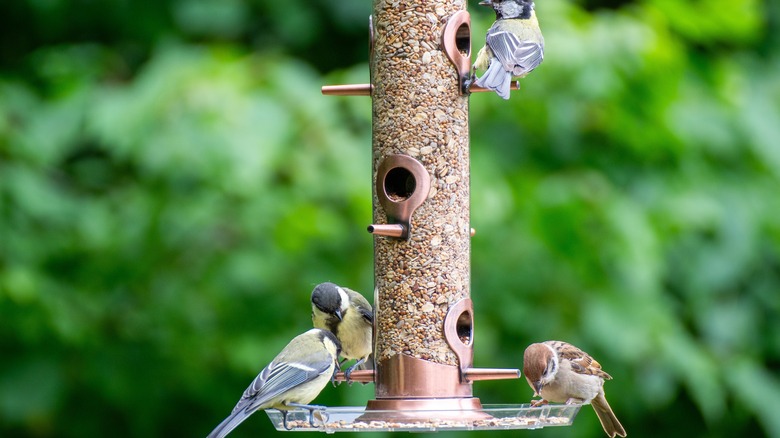Why You Should Reconsider Using Mothballs To Deter Critters From Your Bird Feeder
Moths eating your favorite sweaters and pests commandeering your bird feeder may be very separate problems, but people often use the same solution to solve both. Mothballs are a pesticide with a friendly facade. They are typically sold as small roundish balls, sometimes in fluorescent colors. They began coming into homes in 1948 with the aim of keeping our closets free from fabric-chewing pests like moths and silverfish. Since then, they've not only become a popular wardrobe addition, but they've become the face of a pest-deterring hack that's meant to ward squirrels and other small critters away from your bird feeders.
Whether you've got an opossum problem you're using the pesticide for to get rid of them or squirrels who help themselves to every last bite of birdseed, you may have tried hanging up mothballs near your trees or placed them directly on a surface that's part of your feeder. With how successful these small repellants are with other pests, it would make sense. But in reality, their chemical-laden composition makes them a poor choice as they're dangerous to animals, humans, and the environment. Not only that, but they might not even be an effective measure. Here's why mothballs pose problems as outdoor pest repellents and why you should reconsider their use.
Mothballs are toxic and it's illegal to use them for alternative purposes
If you haven't already immediately stopped using mothballs, there's no time like the present. Their prevalence and the normalcy of seeing them in homes may have disguised their disadvantages well. If you can use them in your home, why would they be that hazardous? Many people might not realize that not only are they toxic for pets and animals, but they're toxic to humans, too. They're usually comprised of one or two chemicals — naphthalene or paradichlorobenzene. These compounds have strong fragrances that you likely are familiar with if you've used them before. Smelling the fumes or accidentally consuming them can have uncomfortable side effects for humans and animals, but in the long term, they could be potentially carcinogenic.
If you've stopped using them personally but repurposed them into a pest control method, there may be several serious ramifications to note. It may come as a surprise, but using mothballs for a different purpose is actually illegal. They should only be in sealed containers in closets — bringing them outside goes against their intended purpose. Humans and animals can both come into contact with them outside and experience health concerns. Not only that, but it can contaminate soil and water and potentially harm the plants, aquatic life, and wildlife that come into contact with the broken-down chemicals.
Mothballs may not be that effective for keeping pests away from your feeders
Toxicity to wildlife and humans is reason enough to leave mothballs in your closet — and to avoid breaking the law — but there's another strong argument for why it's not worth using them. When hung up near or placed around a bird feeder, there's very little proof that mothballs are even remotely effective at keeping pests away. And as the purpose states on the label, these outdoor creatures are a far cry from the pest they're made to deter in the first place. For starters, the strong odor mothballs emit is harder to detect and less effective in open-air areas. There also aren't any studies that back up the idea that these two chemicals are effective at forcefully removing creatures from your home and away from your feeders.
Instead, you can opt for squirrel-proof feeders that are designed to keep them away. Taking the time to occasionally rake away old seeds from the ground can also help clear away any leftovers that other animals will come for. There are other DIY methods to experiment with, too, that don't have these toxicity levels. Peppermint oil, for instance, can possibly repel squirrels and other pests like possums. And before you throw these chemical balls away, be sure to read up on the right way to dispose of mothballs so you don't accidentally allow them to leak into waterways, soil, or in areas where humans and animals spend time.


